- Home
- Leslie Meier
Wedding Day Murder
Wedding Day Murder Read online
DEARLY DEPARTED
The sky was filled with exploding fireworks, and the party moved to the upper deck, crowding around the railing facing the harbor. Sue woke and, guessing that her greenish pallor was not the reflection of the fireworks, Lucy helped her up and led her downstairs.
“Don’ fee-el goo’,” said Sue.
“Look at the fireworks,” urged Lucy, hoping to distract her.
Sue clutched the railing and leaned over. Here we go, thought Lucy. But she was wrong; Sue was pointing to the water.
“Whaash that?”
Lucy looked down and saw something white. “A reflection?”
“No.” Sue leaned over farther, and Lucy grabbed the back of her dress.
“Whoa, there. You’re going to fall in.”
“Thas wha’ happened. Somebody fell in.”
Lucy looked again. Sue was right. Whatever was floating there did resemble a human shape.
“It’s probably garbage or something,” said Lucy, looking up as a giant rocket exploded overhead, filling the sky with light.
“Not garbage.” Sue tugged her sleeve. “Look.”
Lucy looked and saw the white form now had arms and legs and a head, all floating a few inches below the surface of the water. Another wave came and the body rolled over. Even in the dim light, Lucy was sure it was Ron. . . .
Books by Leslie Meier
MISTLETOE MURDER
TIPPY TOE MURDER
TRICK OR TREAT MURDER
BACK TO SCHOOL MURDER
VALENTINE MURDER
CHRISTMAS COOKIE MURDER
TURKEY DAY MURDER
WEDDING DAY MURDER
BIRTHDAY PARTY MURDER
FATHER’S DAY MURDER
STAR SPANGLED MURDER
NEW YEAR’S EVE MURDER
BAKE SALE MURDER
CANDY CANE MURDER
ST. PATRICK’S DAY MURDER
MOTHER’S DAY MURDER
Published by Kensington Publishing Corporation
A Lucy Stone Mystery
WEDDING DAY MURDER
LESLIE MEIER
KENSINGTON BOOKS
http://www.kensingtonbooks.com
All copyrighted material within is Attributor Protected.
Table of Contents
DEARLY DEPARTED
Books by Leslie Meier
Title Page
Chapter One
Chapter Two
Chapter Three
Chapter Four
Chapter Five
Chapter Six
Chapter Seven
Chapter Eight
Chapter Nine
Chapter Ten
Chapter Eleven
Chapter Twelve
Chapter Thirteen
Chapter Fourteen
Chapter Fifteen
Chapter Sixteen
Chapter Seventeen
Chapter Eighteen
Chapter Nineteen
Chapter Twenty
Chapter Twenty-one
Chapter Twenty-two
Chapter Twenty-three
Teaser chapter
Teaser chapter
Teaser chapter
Copyright Page
Chapter One
Standing in her kitchen in Tinker’s Cove, Maine, where she was cooking up a big pot of clam chowder base she planned to freeze for easy summer suppers, Lucy Stone knew she was in the final countdown. The hands on the old Regulator clock read a quarter past three; in moments the school bus would arrive for the last time until next September. It was Monday, June 17—the last day of school.
Watching the second hand jump forward, Lucy felt her freedom ticking away. Oh, she’d had a better run than usual this year. Thanks to several heavy snowstorms, the school calendar had been extended to make up the lost days. But now, the 180 days mandated by the Tinker’s Cove school board and agreed to by the teacher’s union had finally been completed.
The grind of gears as the big yellow school bus started the climb up Red Top Road told Lucy her time had run out. This must be what it feels like to be a condemned prisoner who hears her last appeal has been denied, she thought. She went over to the screen door and listened. It was like this every year; she could hear the children’s excited screams as the bus drew closer. Then the brakes squealed and the doors flapped open.
“Talk about your cold-blooded killers,” said Geoff Rumford, pointing at a bowl full of seashells Lucy had set on the table as a centerpiece, “nothing beats your humble moon snail.”
Lucy glanced around the dining room table where they were gathered and then looked at the bowl of seashells she had used for a centerpiece. She had taken extra care setting the table, not only because Geoff was a guest, but because it was the first time in a long time that the whole family had been able to eat together and she had wanted to make it special.
“I’ve always thought moon snails are pretty,” she said, studying the bleached white shells. She picked one up, noticing its satisfying round shape and the neat, concentric whorl of dark gray on one side. It was as if an artist had taken a fine brush and added the subtlest swirl of color to emphasize the snail’s shape.
“This snail doesn’t look like much of a threat to me,” she added, smiling broadly at Geoff. Geoff always made her smile. He was young—in his late-twenties—and good-looking, but that was only part of it. It was also that she so wholeheartedly approved of Geoff. He was a graduate of the local high school in Tinker’s Cove and had gone on to college and was now working on his doctorate in marine biology at Columbia University in New York City. He was a young man with bright prospects—exactly the sort of young person she hoped her own four children would turn out to be.
“Not a threat to you, but believe me, pretty terrifying to a scallop or clam.” Geoff winked at Zoe, at six years of age the youngest of Lucy’s children, and started humming the shark theme from Jaws.
“That’s right,” chimed in Toby, at eighteen the oldest, who had just finished his freshman year at Coburn University in New Hampshire. He was spending his summer vacation working for Geoff, helping with his thesis project. “The moon snail has a special organ called a radula which it uses to drill right through the shell of a poor, helpless little blue-eyed scallop.”
Sara, who was thirteen and a champion of all animals, gulped hard.
“The scallop can’t get away,” continued Toby, smiling rather meanly. “It just has to sit there while the moon snail drills away at its shell.”
“What happens then?” asked Elizabeth, directing her question at Geoff. She was seventeen and would continue her education in the fall at Chamberlain College in Boston. In the meantime, she was looking for more excitement than her summer job as a chambermaid at the Queen Victoria Inn could offer.
“Uh, well,” replied Geoff, growing a bit red around the collar, “the snail sucks out the clam and eats it for dinner. Just like we’re doing. This chowder is delicious.”
“Lucy’s a great cook—when she bothers to take the time,” said Bill, from his seat at the head of the table.
That’s how it was with Bill these days, she thought. Always that note of criticism. She’d first noticed it last fall, when he was out of work for a few weeks. He’d promptly gotten another job and their finances had soon recovered, but not Bill’s spirits. Hopefully it was just a temporary phase, a little bout of insecurity. She hoped so; she was tired of constantly struggling to keep her temper—not that she always managed to succeed.
“What time?” she asked, her voice rising in pitch. “Between work and the kids’ schedules, there’s no time to make dinner from scratch.” She looked at her husband. “Now that school’s out, I’m hoping we can have more family dinners.”
Bill’s expression was doubtf
ul. “Since you’re working full-time, how’s that going to happen? It’s going to be pizza, pizza, hamburgers and more pizza.”
Lucy changed the subject. “Would anyone like seconds?”
“Don’t mind if I do,” said Geoff, passing his bowl over for a refill.
“So, Geoff,” said Bill, passing his bowl, too. “What is this research project all about, anyway? Not snails, I bet.”
“Not snails. Lobsters. As I’m sure you know, there’s been a sudden drop in the population and I want to find out why.”
“I thought it was overfishing,” said Lucy, who worked as a reporter at the local weekly newspaper and was familiar with the problem. Declining catches and increased regulations had brought the industry to near collapse, and tensions were running high on the waterfront as fishermen, some of whom were the sons and grandsons of seafaring men, saw their traditional way of life threatened.
“Well, that’s part of the problem, but the fishermen say they’re seeing a lot more sick and diseased lobsters that they can’t sell. If we can find out what’s going on, we may be able to keep the stock healthier.”
“What does it matter?” asked Sara, with a resigned sigh. “They’ll kill them anyway.”
“It’s jobs, silly,” said Toby, his voice weary with the weight of the knowledge and sophistication he’d acquired in his freshman year. “This is Maine. Lobsters are big business.”
“Well, I don’t think it makes any difference to the lobsters,” Sara answered self-righteously.
A honk sounded in the driveway and she jumped to her feet.
“Where do you think you’re going?” demanded Bill.
“The movies. Mom said it was okay.”
“I did? I don’t remember that.”
“You know. With Jessica and Caitlin and Meghan. I haven’t seen them since school got out a whole week ago.”
“I must have forgotten,” said Lucy.
Bill looked to Geoff for sympathy. “If I had a dollar for everything she’s forgotten lately . . .”
“Who’s driving?” asked Lucy.
“Caitlin’s mom. And she’s bringing us home, too.”
“Okay. But remember you have to get up early tomorrow.” Sara and Zoe both went to the day camp at the local Friends of Animals shelter, and Sara was a counselor-in-training. It was the cheapest camp Lucy could find, but the girls’ camp fees were the main reason Lucy had switched from part-time to full-time at the paper.
Sara ran out, letting the screen door slam behind her.
“I don’t know why we can’t ever seem to have a family dinner anymore,” grumbled Bill. “When I was a kid, my mom made . . .”
“Things have changed so much since then,” teased Lucy, determined not to be drawn into a fight. She knew Bill didn’t want her working at all. If he had his druthers, she’d be a full-time housewife like his mother was. “Take electricity and indoor plumbing, for example.”
Bill grimaced at her but didn’t say anything.
“So what exactly will you and Toby be doing?” asked Elizabeth, fixing her dark eyes on Geoff and twirling a lock of her short, dark hair around her finger. “How will you actually conduct the research?”
“Just like the lobstermen, with one big difference. We’ll trap the critters and log their condition, draw some blood, and then we’ll return them to the water.”
“There must be more to it than that,” insisted Elizabeth, batting her eyelashes.
Watching her daughter’s performance, Lucy hoped she wasn’t going to spend the summer throwing herself at everyone she met who happened to wear pants.
“Oh, there is,” said Geoff, sitting up a little straighter in his chair. “We have to analyze the blood, identify any parasites, and write up the results.”
“It sounds fascinating,” cooed Elizabeth, propping her chin on her elbow and leaning toward Geoff.
“It is pretty interesting, actually,” said Geoff, his lips curling into a smile.
“Aren’t you going out or something tonight?” asked Toby, irritated that Geoff was paying so much attention to his sister.
“Not until six-thirty.”
“It is six-thirty,” said Toby.
“Shit!” exclaimed Elizabeth, jumping up.
“Watch your language,” admonished Bill.
“Uh, sorry. I’ve got to go,” she said, pausing to sway her hips provocatively as she passed Geoff.
“Better not keep your date waiting,” said Geoff.
“It’s not a date—she’s just going to the mall with Jenny,” said Toby.
“Don’t act like you know who I’m going out with because you don’t,” said Elizabeth. “Besides, it’s none of your business.”
“It is if you’re planning to take the truck, because I’m going to need it later.”
“Can’t Eddie pick you up for once?” said Elizabeth, giving tit for tat.
“No, he can’t. Besides, I got permission from Dad.”
Bill nodded and handed the keys over to Toby.
Elizabeth appealed to her mother. “Mom, can I borrow your car?”
“I guess so.” Hearing the phone ring, she added, “Get that, please.”
“Sure thing.” A moment later, she was back. “It’s for Zoe.”
“For me?” Zoe was delighted. Although the phone seemed to ring constantly for her older siblings, it was rarely for her.
“Just say you have to call back because it’s dinnertime,” said Lucy, invoking a nearly forgotten family rule.
“Do I have to?”
Lucy looked around at the empty places at the table and decided she was fighting a losing battle.
“Just this once,” she said, relenting. “I don’t know why I bothered to make dessert if nobody’s here to eat it.”
“Dessert?” Bill was definitely interested.
“Strawberry-rhubarb pie.”
“Homemade?”
Lucy wasn’t about to admit she’d bought it at the grocery store. “Let’s have our pie and coffee in the gazebo,” she said.
The gazebo was tucked in beside the house, in a spot that was secluded from the road but still had a view of the green, tree-covered mountains in the distance.
“Wow,” said Geoff when he saw the structure for the first time. “This is really something.”
The trim, white summerhouse was indeed a triumph of the builder’s craft, constructed last fall by Bill when a job fell through and he had time on his hands. He was a restoration carpenter and he’d used his knowledge of Victorian architecture to create a fanciful little jewel complete with a pagoda-style roof and plenty of gingerbread trim.
“I just love it,” said Lucy, who was carrying a tray loaded with pie, dessert dishes, and mugs of coffee. She was keeping a watchful eye on the dog, Kudo, who had trotted up hopefully as soon as they appeared in the yard. He was a sociable mutt, but Lucy suspected he was primarily interested in snagging some pie.
“Want me to tie him up?” asked Bill, who was carrying the cream and sugar.
“Oh, no. He’ll be good,” said Lucy, who hated to see a dog tied.
“Not so far.” Bill nodded at the dog, who had buried his nose in Geoff’s crotch.
“Don’t mind him,” said Lucy with an embarrassed giggle. “It’s just his way of saying hello.” She set the tray down on the table and seated herself in a wicker chair. “If you ignore him, he’ll lose interest,” she advised Geoff, who was vainly attempting to push the dog away.
“Kudo! Stop that!” bellowed Bill.
The dog turned around to give Bill a questioning glance, and Geoff seized the opportunity to escape.
“Lucy, I’ve told you before, you’ve got to train that dog.”
“I’ll add it to the list.”
“Well, if you wouldn’t insist on working at that newspaper, you’d have plenty of time for some projects this summer,” said Bill.
“My main project is going to be spending a few pleasant hours out here,” said Lucy, cutting the pie. She tossed
a piece of crust to Kudo, who swallowed it whole in one gulp.
He sat politely, staring at the pie, mutely suggesting that he could stand a tad more.
“No,” she told him.
With a sigh, he settled down and rested his chin on his paws.
“This is incredible,” said Geoff, tilting his head back to admire the intricate joinery.
“I’ve always dreamed of having a gazebo,” said Lucy. “I love coming out here. It’s just a few feet from the house, but somehow it seems as if it’s miles from everything. No phone. No TV. It’s so peaceful.”
“Can you see the sunset from here?”
“You betcha,” said Bill, lifting a forkful of pie to his mouth. “That’s why I put it here.”
“We have beautiful sunsets, with the mountains and all,” added Lucy.
“That’s one of the things I miss in New York,” said Geoff, leaning back in his chair. “I mean, I’m sure they have great sunsets with the Hudson River and the Palisades and all, but I’ve never actually seen one. I always seem to be stuck in a classroom or a lab or in the subway.”
“So you chose a research project that allowed you to come back home?”
“It was a no-brainer,” said Geoff. “Besides, my grant isn’t too big, so I’m on a pretty tight budget. This way I can keep costs low by bunking with Fred.”
Lucy and Bill both knew Fred Rumford, Geoff’s older brother, who was a professor of archaeology at nearby Winchester College. He was currently excavating a Native American burial site on Andy Brown’s farm.
“We really appreciate that you hired Toby,” said Bill. “It’s a great opportunity for him.”
“He’s a super kid,” said Geoff. “He’s going to earn his wages, though. I plan to work him hard.”

 Christmas Card Murder
Christmas Card Murder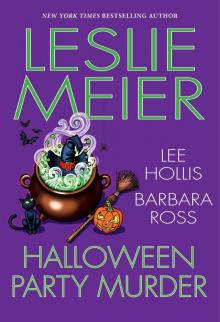 Halloween Party Murder
Halloween Party Murder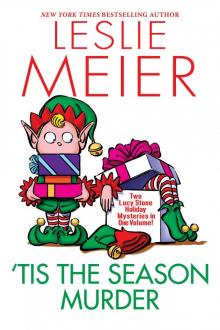 'Tis the Season Murder
'Tis the Season Murder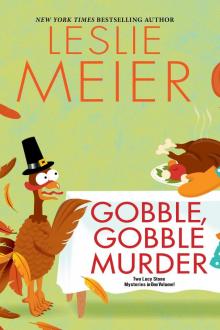 Gobble, Gobble Murder
Gobble, Gobble Murder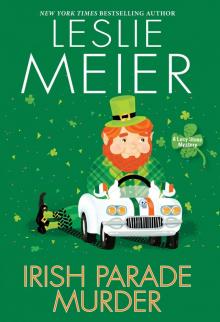 Irish Parade Murder
Irish Parade Murder Bake Sale Murder
Bake Sale Murder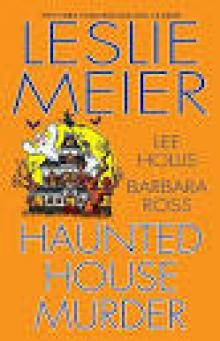 Haunted House Murder
Haunted House Murder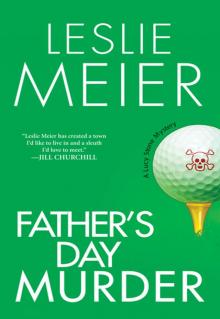 Father’s Day Murder
Father’s Day Murder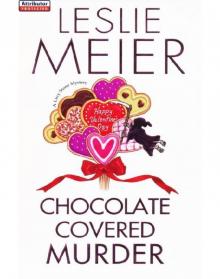 Chocolate Covered Murder
Chocolate Covered Murder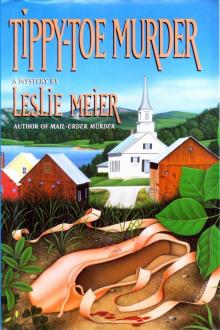 Tippy Toe Murder
Tippy Toe Murder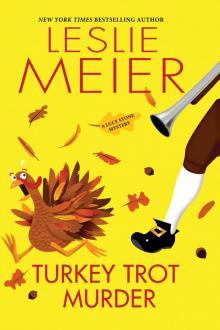 Turkey Trot Murder
Turkey Trot Murder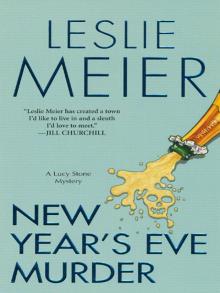 New Year's Eve Murder
New Year's Eve Murder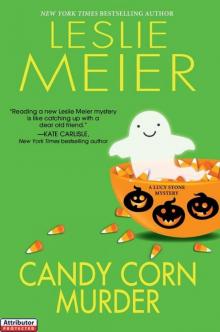 Candy Corn Murder
Candy Corn Murder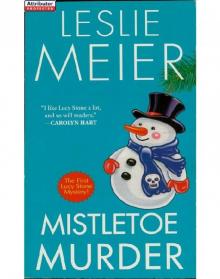 Mistletoe Murder
Mistletoe Murder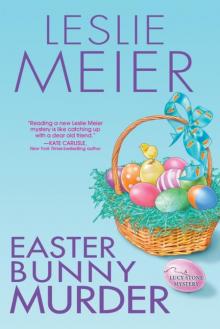 LStone 20 - Easter Bunny Murder
LStone 20 - Easter Bunny Murder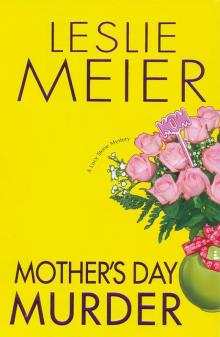 Mother's Day Murder
Mother's Day Murder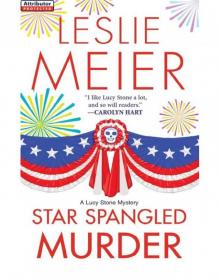 Star Spangled Murder
Star Spangled Murder Silver Anniversary Murder
Silver Anniversary Murder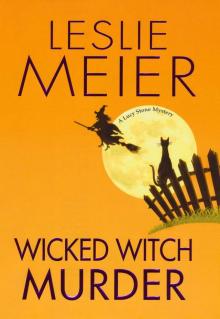 Wicked Witch Murder
Wicked Witch Murder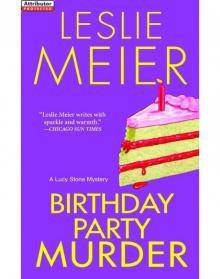 Birthday Party Murder
Birthday Party Murder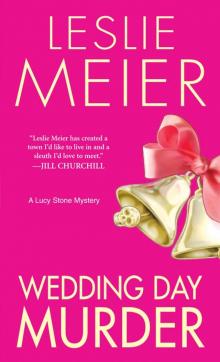 Wedding Day Murder
Wedding Day Murder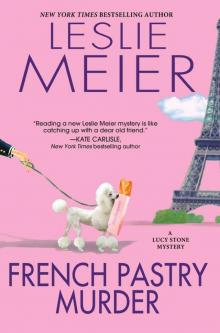 French Pastry Murder
French Pastry Murder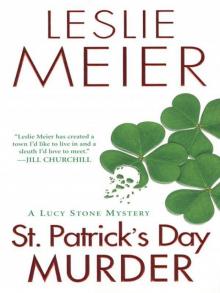 St. Patrick's Day Murder
St. Patrick's Day Murder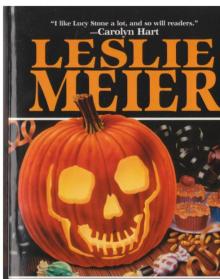 Trick or Treat Murder
Trick or Treat Murder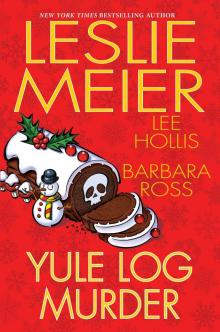 Yule Log Murder
Yule Log Murder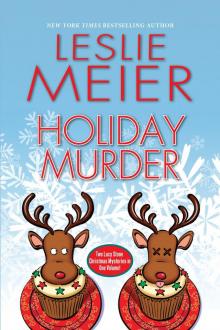 Holiday Murder
Holiday Murder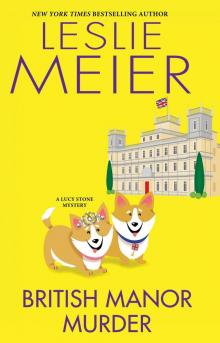 British Manor Murder
British Manor Murder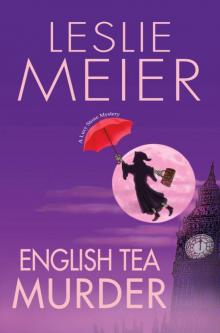 English Tea Murder
English Tea Murder